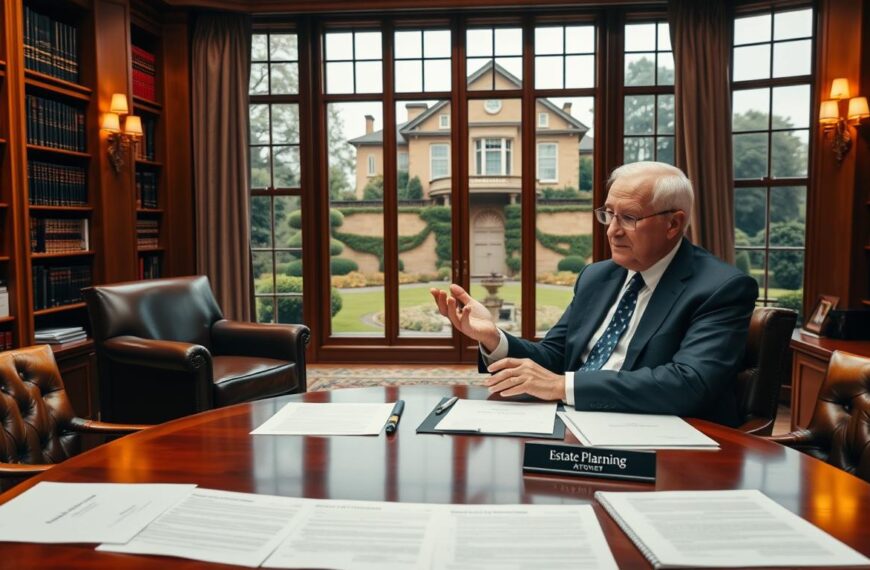Estate planning lawyers help people plan their assets for life and after death1. They make sure the estate goes to the right people, save on taxes, and avoid probate when it’s possible. Their main tasks include making legal documents, planning for taxes, handling probate, solving disputes, and guiding those in charge2.
Lawyers charge in two ways: a fee for making the plan and an annual fee for managing trusts1. It’s wise to check your plan every 3-5 years or after big life events like getting married, having a child, or buying a new property1. Getting help from a pro is key for complex cases, like businesses or assets abroad, to save on taxes1.
How long it takes to plan an estate varies. Simple plans can take 4-6 weeks, but more detailed ones like trusts or business plans might need 3-6 months1. Financial advisers can help with some planning, but estate lawyers do more specific tasks1.
Understanding Estate Planning Fundamentals
Estate planning is a detailed process. It helps manage assets and ensures wishes are followed if someone can’t make decisions or passes away3. It’s important for everyone, no matter the size of their estate4. Yet, only about 14% of people have made a formal estate plan3.
Definition and Core Elements
Estate planning is about making legal documents like wills, trusts, powers of attorney, and healthcare directives4. These documents protect the owner’s interests and care for dependents. They also state how assets should be shared and personal care decisions made5.
Key Legal Documents
The main legal documents in an estate plan are:
- Wills: Make sure assets go to the right people.
- Trusts: Protect assets and save on taxes.
- Powers of Attorney: Choose who makes financial and medical decisions.
- Healthcare Directives: Decide on medical treatment and end-of-life care.
Estate Planning Benefits
Estate planning helps keep wealth safe, reduces taxes, and clarifies how to manage and share assets5. It also brings peace of mind, protects heirs, and helps achieve charitable goals5.
But, many people haven’t made a will, and some don’t know about lasting powers of attorney3. Making a detailed estate plan is key, no matter your age. It greatly affects how your assets are protected and shared5.
“Estate planning is not age-restricted, yet it is recommended when assets or beloved individuals must be protected.”3
In summary, estate planning is essential. It ensures wishes are followed and loved ones are cared for, even when someone can’t make decisions or dies. By knowing the basics and legal documents, people can protect their assets and look after their beneficiaries4.
Primary Duties of Estate Planning Solicitors
Estate planning solicitors are key in making sure an individual’s wishes are followed and their family is looked after. They create important legal documents like wills and trusts. This helps in smoothly passing on assets and money6. They also help with tax planning to reduce the tax on inheritance, which can be up to 40% on amounts over £325,0006.
They handle the probate process, which is the legal part of dealing with an estate6. This can take 16 weeks to get started, and another 3 to 6 months to finish6. They also help solve any disputes among family members or between them and the executor, making sure everything goes smoothly6.
These solicitors advise on legal duties for those in charge of an estate, like executors and trustees7. They make sure an estate is set up as the person wanted, takes care of family, and saves on taxes7. They also help with Lasting Powers of Attorney, which lets someone choose who will make decisions for them if they can’t8.
In summary, estate planning solicitors are vital in helping people and families deal with the legal and financial parts of managing an estate. Their knowledge ensures a person’s wishes are respected and their family is taken care of, even if they can’t make decisions themselves7.
| Service | Description |
|---|---|
| Will and Trust Creation | Drafting and reviewing wills and trusts to ensure an individual’s final wishes are carried out and their loved ones are provided for. |
| Tax Planning | Advising on strategies to minimise inheritance tax exposure, such as leaving money to charity, setting up trusts, and lifetime giving. |
| Probate Assistance | Guiding clients through the probate process, including obtaining the grant of probate and administering the estate. |
| Dispute Resolution | Resolving any conflicts that may arise among beneficiaries or between beneficiaries and executors. |
| Fiduciary Advice | Advising executors, trustees, and other fiduciaries on their legal responsibilities and ensuring the estate is managed in accordance with the individual’s wishes. |
“Estate planning is not just about preparing for the inevitable; it’s about ensuring your legacy is preserved and your loved ones are provided for, even in the event of your incapacity or death.” – John Smith, Chartered Estate Planning Solicitor
What Estate Planning Services Include
Estate planning is about making sure your assets go where you want them to. Solicitors specialising in estate planning offer many services to meet your needs.
Will and Trust Creation
An estate planning solicitor helps create a will that shows how you want your assets shared. They also set up trusts to protect and transfer assets. This helps reduce estate tax reduction and avoids probate9.
Tax Planning Strategies
Estate planning solicitors team up with financial advisors to lower your inheritance tax bill. They use beneficiary designations, make tax-smart gifts, and set up trust administration. This keeps some assets out of your estate10.
Asset Protection Measures
They also advise on long-term care planning and protecting your assets. This includes powers of attorney, advance healthcare directives, and ways to keep your wealth safe. This ensures your loved ones are financially secure9.

Working with an experienced estate planning solicitor helps manage your estate. Good planning and expert advice are key. They make sure your wishes are followed and your family’s financial future is secure.
Essential Skills and Expertise Required
Estate planning solicitors need a wide range of skills. They must have deep legal expertise in estate law. They also need to understand financial knowledge for tax planning and protecting assets11. Good interpersonal skills are key to talking about sensitive topics with clients and solving family disputes11.
They must pay close attention to detail when creating legal documents and reviewing financial statements. It’s also important for them to keep up with changes in laws and regulations. This ensures they can give the best advice to their clients11.
To improve their skills, estate planning professionals often get special certifications. For example, the Chartered Trust and Estate Planner (CTEP) requires at least three years of experience and a degree11. The Accredited Estate Planner (AEP) needs five years of experience and professional references11.
The Certified Trust and Fiduciary Advisor (CTFA) is needed for trust officers. It requires three years of experience and ongoing education to keep the certification11.
The field of estate planning offers many career paths. Law firms, financial institutions, and more look for professionals with the right skills12.
| Estate Planning Role | Average Annual Salary Range |
|---|---|
| Estate Planning Attorney | $95,000 – $150,000 |
| Financial Planner | $88,000 – $110,000 |
| Trust Officer | $70,000 – $100,000 |
| Tax Advisor | $60,000 – $130,000 |
| Probate Paralegal | $45,000 – $70,000 |
| Estate Administrator | $50,000 – $85,000 |
Salaries vary based on experience, location, and more12. The demand for estate planning professionals is growing. This is due to an aging population and more complex wealth issues12.
“The ability to navigate the complexities of estate planning, from tax strategies to trust administration, is essential for solicitors in this field.”
Conclusion
Estate planning is for everyone, not just the rich13. It makes sure your assets go where you want, saving taxes and caring for your loved ones14.
Getting help from estate planning solicitors is key. They know the law, finance, and personal stuff. This gives you peace of mind and avoids fights over your stuff14.
They help with wills, trusts, and care plans. Estate planning solicitors are crucial in planning your future and protecting your family’s money14.
FAQ
What do estate planning lawyers do?
Estate planning lawyers help people plan for their assets before and after they pass away. They make sure the transfer of assets to loved ones is smooth and tax-efficient. They also help avoid probate when it’s possible.
They draft important legal documents and plan for taxes. They manage estates, settle disputes, and advise on legal duties.
What are the core elements of estate planning?
Estate planning is about managing assets when someone can’t or has passed away. It includes making legal documents like wills and trusts. These documents protect the owner’s wishes and care for dependents.
What are the primary duties of estate planning solicitors?
Estate planning solicitors do many important tasks. They create legal documents like wills and trusts. They also help with tax planning to reduce taxes.
They manage probate, solve disputes, and advise on legal duties. Their work ensures the smooth transfer of assets.
What services do estate planning solicitors provide?
Estate planning solicitors offer a wide range of services. They create wills and trusts and identify beneficiaries. They also set up powers of attorney and healthcare directives.
They help with tax planning and set up trusts to protect assets. They work with financial advisors to lower estate taxes and avoid probate.
What skills and expertise do estate planning solicitors require?
Estate planning solicitors need a lot of skills and knowledge. They must know estate law, tax planning, and trust administration well. They also need to be good at talking to clients and solving family disputes.
They must pay close attention to detail when making legal documents. They also need to understand financial statements.

















